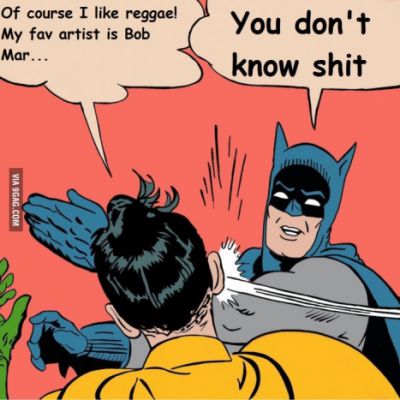
 3 bullshit assumptions about reggae music!
3 bullshit assumptions about reggae music!
Reggae | Tuesday 5th November 2013 | Noam
1) Reggae is always the same
Any occasional listener will say the same thing: “Reggae is always the same".
This is not true. In fact, there are many subgenres in “reggae” music:
Rocksteady, Ska, Lover’s Rock, Rockers, Raggamuffin, Reggaeton, Reggae Fusion, Roots, Revival, Dancehall, Dub, Meditation Dub, Dub Poetry, Steppas, etc.
Why will any occasional listener think all of these are “reggae”? Because of a recurrent offbeat guitar/piano chord, powerful bass and, of course, a Jamaican voice (most of the time). But we need to reconsider that stereotype; Rock, Metal, Hard Rock, Pop Rock, Heavy Metal, Psychedelic Rock share similar rhythms, guitar riffs and cultural characteristics. But our ear is used to hearing the differences between Anglo-saxon genres. This is usually not the case for Caribbean music.
However, even this distinction is not entirely true. Rocksteady and Ska were very much influenced by R&B and Jazz. Indeed, in the late 1950’s, early 1960’s American culture was becoming predominant in Jamaica. The American influence on music is far from negligeable. Bob Marley & the Wailers, for example, used to look more like The Temptations then the all-time classic image of Bob with a massive joint on the Catch A Fire album cover.
2) You need to smoke pot to appreciate reggae
Although it is definitely true that reggae and a spliff is like coffee and a cigarette (both wonderful combinations), the assumption that reggae = weed, is because of the Rastafarian nature of the musical genre.
However it is crucial to understand a couple of things. First of all, marijuana is ritualistic for Rastas. It is supposed to help them get closer to God (indeed guys, weed is not only a recreational drug!). In fact, it is true that smoking herb for Rastas is close to being the equivalent of eating the host after mass for Christians.
Secondly, reggae music is heavily loaded with religious rhetoric and is considered as being spiritually heightening. The musicians are obviously stoned when they make the music. The same way Pink Floyd, Funkadelic, Jefferson Airplane were completely out of it when they composed, which eventually led to extremely psychedelic music, reggae is made by stoned people which, in turn, explains why it reaches new heights when you’re stoned. Nonetheless you can appreciate some Pink Floyd without being on acid and the same applies for weed and reggae.
Thus the closeness of weed and reggae does not make the genre exclusively accessible to pot smokers. Stereotypes have elements of truth. But as we all know generalisations are hasty and often false. Furthermore, Hip Hop and Jazz have as much of a weed culture as reggae. The only difference is that we don’t necessarily make those associations.
3) Reggae music is marginal
It is certainly true that the world of reggae is a rather small genre in the realm of musical production. However, nobody would have thought that a little ex-British colony in the Caribbean would have such a massive influence on Western music. It is not roots reggae I want to talk about, but the specific type of reggae that is called “Dub”. Dub, from “dub plate”, is originally the instrumental B side of the vinyl which was used by selectors (sound system DJs/MCs) to perform a live vocal set.
Back in the day, the popularity of the tracks was measured on how crazy the crowd would go. This was the producers’ goingfuckingcrazymeansmusicisgoodmeter. Among pioneers of dub you find big names like Lee “Scratch” Perry, Augustus Pablo and King Tubby. The story goes that one night, these guys were playing a set and one of the selectors (obviously tripping) played the wrong side of the vinyl (the B side). Nobody had ever heard the instrumental alone. At first the crowd was surprised, but then started loving it and went completely bonkers.
They understood that there was potential for instrumental music, “dub” music. With the technological advances of the times, they were capable of sampling music (isolate instruments/tracks) and put the samples together with effects such as echo and reverb. Now, what is Hip Hop? Electronic music? Samples! Although I cannot confirm with certainty whether sampling was a Jamaican phenomenon at first, I can safely assert that the creation of “dub” and its exportation to the UK and the US has paved the way for many popular genres of our era.
Noam Obermeister
